5 Free SEO Tools to Improve Your Traffic | Smutlancer SEO Series
As part of our plans for 2021, we’re introducing a few blog series written by either myself or Molly (or both of us!), based on the volume of questions we receive about certain topics. No surprise here, SEO is huge. Every time we’ve tried to explain it in a podcast episode, it quickly got out-of-hand because the topic is complex with lots of moving parts. This first post in our Smutlancer SEO series focuses on tools you can use to help you get your arms and head around SEO. As we move forward in the series, we’ll go over more details but today, consider this a brief overview.
What is SEO?
This might seem like obvious to some, but for others, it’s the most confusing part of all. How can you use SEO to grow your website traffic when you’re not even sure what it is? SEO stands for search engine optimization. SEO consists of methods and tools you use as well as the content you create to help your site show up in Google (and other platforms) search results. Ideally, when you’re consistently found in a search engine, your traffic grows. Good SEO doesn’t automatically mean you’ll have a huge audience, but it will create the opportunity for people to know you exist in the first place. Good SEO means that, ideally, your site will be found for specific keywords or phrases you want to be known for:
- Write a lot of dildo reviews? You’d probably like to be found by people looking to read dildo reviews — or buy dildos (for those sweet, sweet affiliate sales).
- Talk about BDSM and kink? Ideally, people who want to read about BDSM and kink will find you when they Google a term related to BDSM.
That’s a very, very general explanation of SEO. Billions of words have been written across the internet about what SEO is and how it works. If you’re at the very beginning, it’s time to do some research. Once you’ve got a handle on what it is, the next obvious question is, “How do I do SEO?”
Here are some things we’ve said or written about SEO in the past:
January 2020 Mailbag podcast episode
What are Backlinks and Why Should You Care? (blog post)
How to Build Traffic on Your Site (blog post by Girl on the Net)
How to Find New Readers podcast episode (Google and search are mentioned toward the end)
Traffic Ups and Downs podcast episode
Using a few tools won’t automatically give your site good SEO, but they can help you. Below are five tools I’ve used that have the potential to improve your site traffic — which is the point of SEO, after all.
Yoast
Probably the most common SEO plugin for WordPress sites, Yoast is FREEEEEEE and makes optimizing your website, blog posts, and pages extremely easy. The plugin literally gives you a list of things to do or not do in your WordPress dashboard as you’re writing a blog post. It works off a green light system so if you get a green light, you’ve done it right. Orange needs improvement. Red means you might be screwing it up royally. (This system is subjective because not all content is meant to get a green light based on the standards Yoast includes for SEO. If you write poetry or fiction, you may never get the green light and that’s okay.)
As you research best SEO practices, you’ll hear all about meta descriptions, headlines for SEO, subheadings, and more. Yoast gives you the tools to make following SEO best practices super easy. Even better, the Yoast website has a ton of information on SEO and how to use Yoast.
Pro tip: Do not let all the options in Yoast stress you out. We’ll look at this plugin in more detail in a future post in the series, but for now, know that doing even the most basic things will help.
This is what Yoast looks like as I’m writing this blog post:
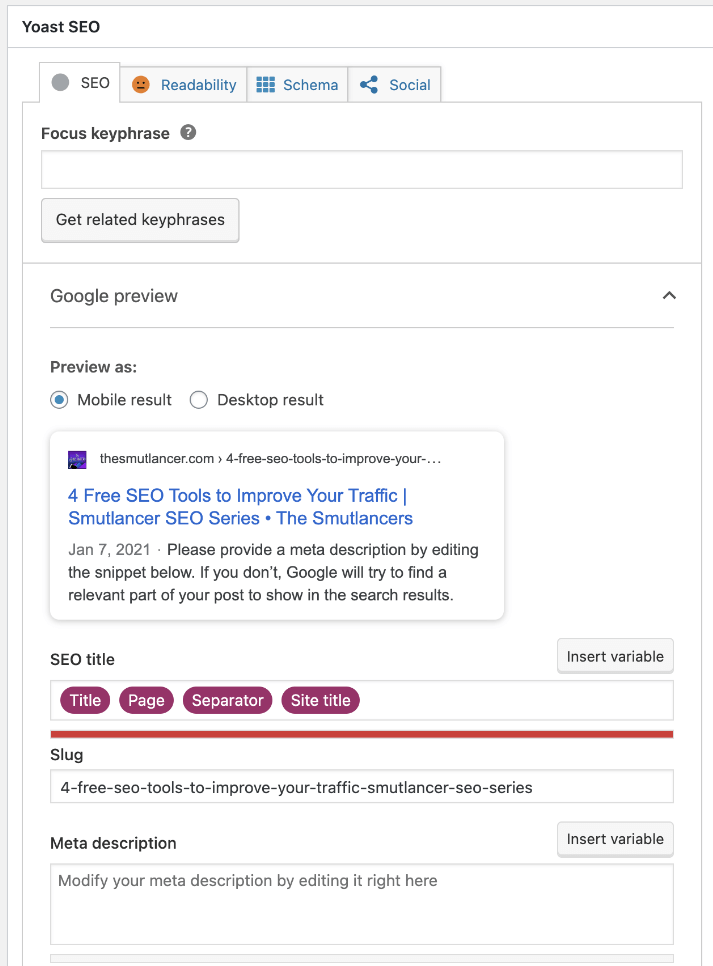
For the record, by the time I finished, I had green lights.
Google Keyword Planner
A big part of SEO success is having your site found for terms and phrases people are searching for — that also fit in with the content you want to or do create. As you may find with Yoast, when you use the “focus keyphrase” field, you can get dinged (by Yoast) for using the same keyword over and over again. At the same time, you might feel like you’re writing about the same thing over and over again and need help coming up with new ideas. This is where Google Keyword Planner comes in. To access it, you will need to get up a Google Adsense account. (Don’t worry — you won’t be required to buy advertising.)
Once signed in, you can choose from two options:
- Discover new keywords
- Get search volume and forecasts.
Since we’re keeping this post simple, let’s focus on “Discover new keywords” for right now. I typed in BDSM and this is what I got:
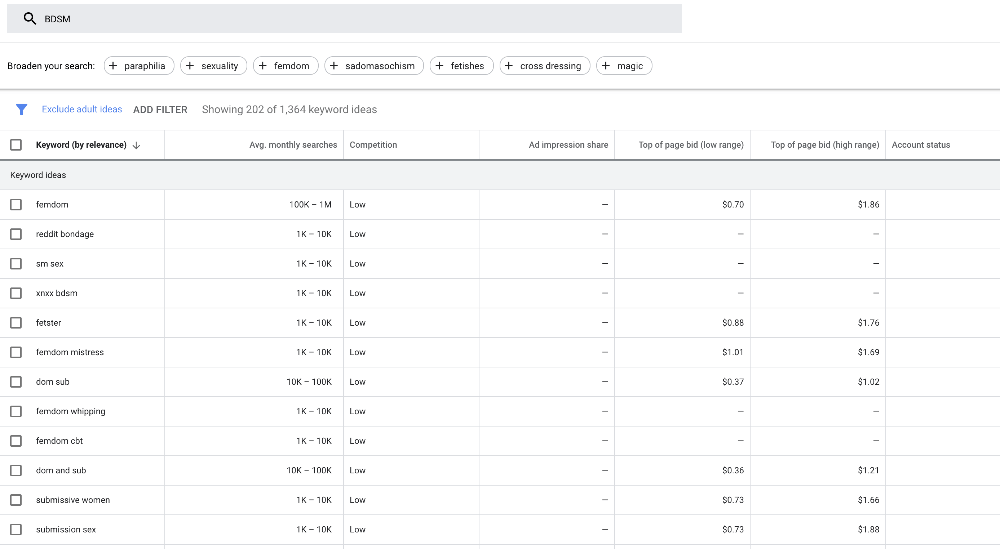
As you can see, not only did it give me the option to broaden my search, it also came back with plenty of keywords that aren’t “BDSM” but that Google recognizes as being within the scope of that topic. You get a lot of information here — some of it about ad pricing which you can just ignore. But it will show you what kind of search traffic different terms get and how “competitive” they are (in terms of ad purchases).
Not only can this tool give you new ways of thinking about a broad topic, but it can also spark new ideas for your content.
Google Search Console
Yes, this is another Google tool. To access Google Search Console, you’ll need to have a Google Analytics account and have your site properly verified with it. Yoast can help with this. This tool lets you know what search terms people use to find you. This helps in a few ways:
- Let’s you know if the keywords or phrases you focus on are getting you found in search
- Tells you how people are finding you in the first place
- Helps let you know what kind of content you should probably keep writing (but only if you want to)
This is what it looks like for the Smutlancer site:
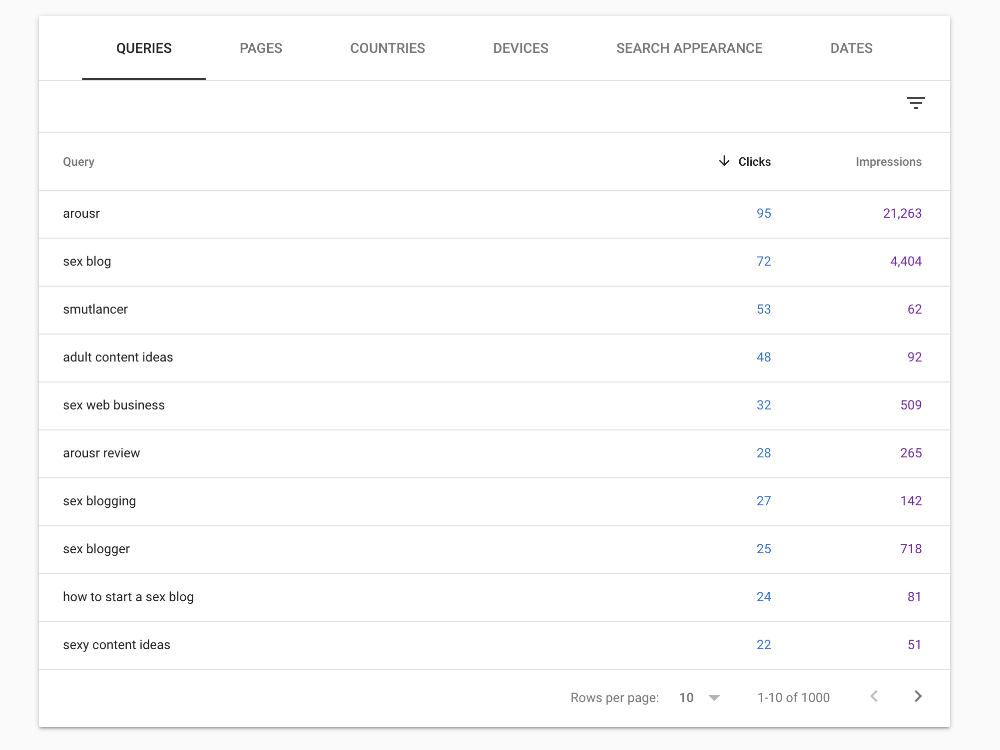
Sometimes you’ll be found for terms you don’t care about. See “Arousr” at the top? That’s for a review/sponsored post I wrote about how to use it to make money. I’m glad it drives a little bit of traffic, but clearly “Arousr” isn’t the focus of this site. The entries for sex blog and other variations are much more aligned with my own SEO goals.
And I’m really proud of the fact the term “smutlancer” has been used as a search term any number of times let alone 53!
Headline Analyzers
There are many, many, many, many, MANY factors that determine how your site or a specific blog post ranks in search engines, nearly all dictated by a mysterious algorithm. But ultimately, good SEO is about the user experience. Does someone have a clear expectation of what your post is about at a quick glance? A big part of that in a search is the headline or title you use for your blog posts. There are a TON of headline analyzers out there, but let me tell you about two:
Coschedule Headline Analyzer
I use Coschedule for freelance clients (and I really need to do a review of it because it’s awesome albeit expensive!). But even if you don’t have an account, you can use the Headline Analyzer. You type the title you want to use, and it gives you a score. The higher the better. For this post, I got a 67 — and I’m actually okay with that because I know I suck at titles and headlines. The first entry requires nothing. If you want to test out more and see how it compares with others, you’ll need to enter your email address. As someone who would love to buy and use Coschedule among all my sites, sharing my email address doesn’t bother me.
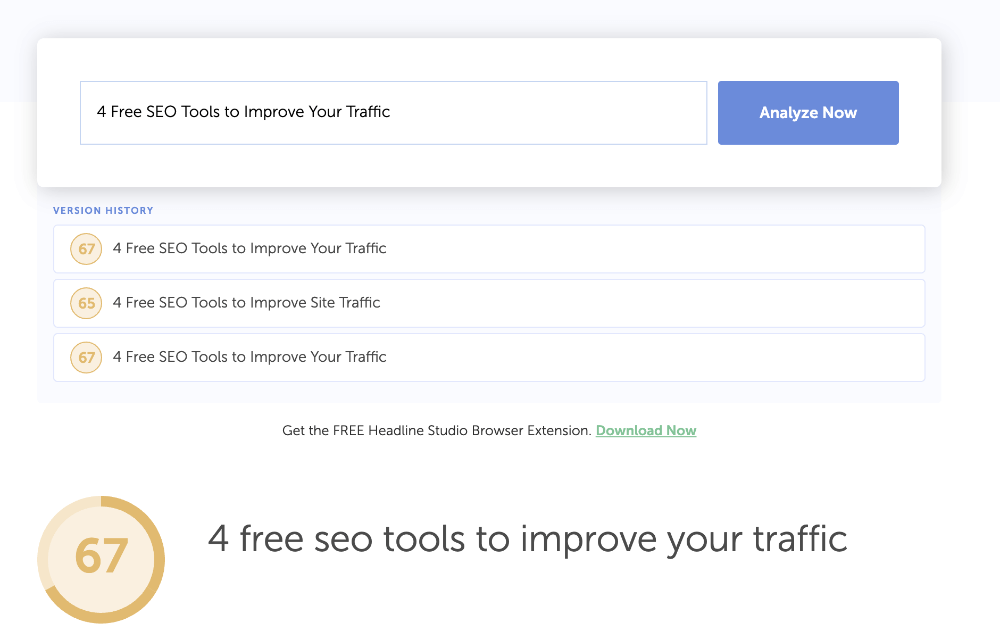
Portent’s Content Idea Generator
I haven’t used this consistently in a while, and technically it’s meant to help you come up with ideas for posts. But it also formulates the headline in a way that’s supposed to be “good” for SEO, too. So let’s say you get a keyword or phrase from Google Search Console or Google Keyword Planner. Head to Portent’s Content Idea Generator and let it do some of the work for you.
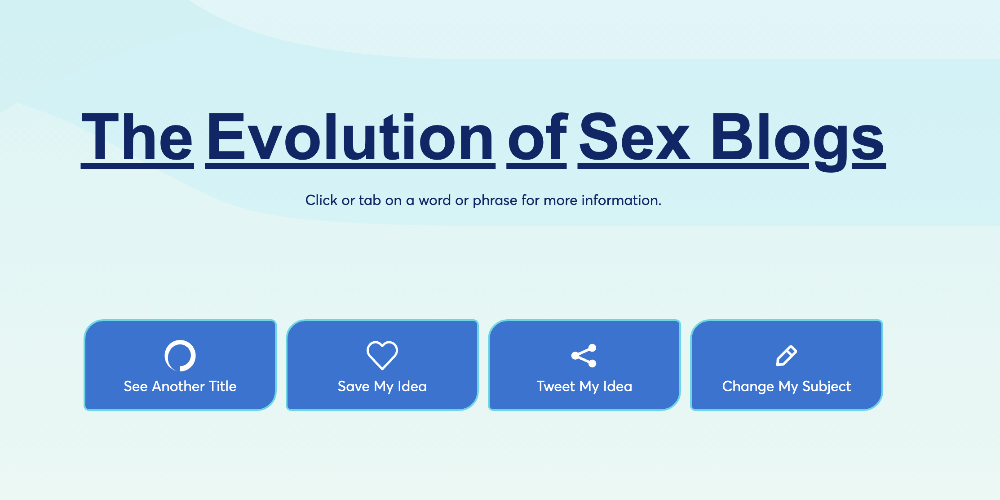
I typed in “sex blogs” as an example and then had to click through multiple absurd options that would never have made sense. But then I found the one you see in the screenshot. As someone who’s had a sex blog since 2012 (and read them since 2011), I could probably discuss this. Though Molly might do it better since she’s been blogging since 2010.
It’s not a perfect tool. One of the first options was “What Sex Blogs Can Do for the MLB” or some such nonsense (MLB = Major League Baseball), but it might help you get creative with a word or phrase while also giving you a catchy title optimized for search.
Pro-tip on headlines/titles: It doesn’t matter how compelling, catchy, quirky, or fun your headline is if your content doesn’t match the expectations of the user. So while the right title can get you a bit of attention, the content is what earns you an audience.
This is just the beginning…
Is there more we could say about SEO? Holy hell, yes! Are these the only tools out there? Nope. There are hundreds if not thousands, if not hundreds of thousands of SEO tools. But these are the ones I’ve personally used over time, and I know Molly has used many of them, too. For SEO newbies, these are a good place to start before branching out to try new things and find what works best for you.
To our fellow SEO nerds out there, what free or inexpensive tools would you recommend?
